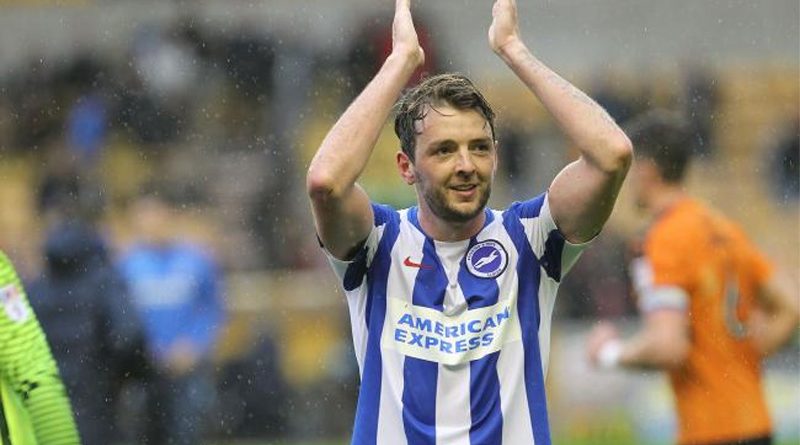Dale Stephens will go down as a Brighton great
“Pass it forward Stephens!” Never again will we hear those words shouted within two minutes of kick off at the Amex Stadium. Dale Stephens has played his final game for Brighton & Hove Albion with a £1 million move to Burnley just waiting to be rubber stamped.
The anguished cry that became as much a part of a home match day as queuing for a train, a flat pint of Fosters and having to remortgage a home to afford a bag of Starburst will be sadly absent whenever it is that we are allowed to return to Falmer to watch live football.
Dale Stephens divided opinion among Brighton fans like few others have ever managed. He was the ultimate Marmite player. To some, he was slow, pondering and as already noted, never played a forward pass. The poster boy for Chris Hughton’s negative football.
To others, he did an underappreciated job anchoring the midfield by doing the unglamorous dirty work. Every team needs a ‘water carrier’ like that and Stephens was ours. If you did not see what Stephens brought to the party, then you did not really understand football.
If we subscribe to the theory that managers know best, then Stephens was a first choice player under three different Albion bosses – Oscar Garcia, Chris Hughton and Graham Potter.
He would have been a regular under a fourth too had he not spent Sami Hyypia’s brief reign of terror battling a serious injury. More on that in a minute.
Dale Stephens played over 200 times for Brighton in one of the most successful eras that the club has ever had. He was a massive part of only the second Albion team to ever win promotion to the top flight.
Up until February, he was one of the first names on the team sheet for both Hughton and Potter in the side which established the club in the Premier League.
Let us take you back to January 2014 when Stephens first arrived at the Amex. The Albion paid £800,000 to Charlton Athletic for his services in the same transfer window in which Liam Bridcutt was sold to Sunderland for £3 million.
Replacing Bridcutt looked like an impossible job. He was one of a very select band of players to have won back-to-back Player of the Season awards and when Gus Poyet He Who Must Be Named said that Bridcutt was good enough to play for Real Madrid, it did not seem like a joke.
Bridcutt was the beating heart of Brighton. When he played well – which was 90 percent of the time – the team played well. When he was out injured, the Albion looked a little lost. Stephens had big boots to fill.
And yet almost from day one, the Albion did not miss Bridcutt. Oscar still managed to get the Seagulls into the top six and Stephens played an important role in that, managing 14 appearances before injury ruled him out of the play off semi finals with Derby County.
That injury would in fact keep him on the shelf for nearly a year. Stephens missed the entire Hyypia debacle, not playing a minute of competitive football between May 2014 and February 2015 when Hughton had been in the job for a month.
Now, Hyypia clearly didn’t help himself by being clueless, but is it coincidence that our worst season this decade came at the one time when Stephens was holed up in the physio’s room for nearly nine months?
With Stephens back in the side alongside new signing Beram Kayal, Brighton suddenly went from avoiding relegation to the League One by the skin of their teeth to being on the cusp of the Premier League.
Brighton’s eventual promotion was based on strong partnerships across the pitch. Lewis Dunk and Shane Duffy at the back. Anthony Knockaert feeding Glenn Murray in attack. And in the middle of the park, Kayal and Stephens for the most part.
There’s a reason that players as good as Steve Sidwell and Oliver Norwood were third and fourth choice midfielders behind Stephens and Kayal in the 2016-17 promotion season.
Even when Potter took over and many assumed Stephens would be instantly dropped because his apparent slow, backwards passing style would not fit in with a brave new era, Stephens kept his place in the side.
Not only that, but he played really well in the first four months of Potterball. Our WAB Power Rankings had Dale Stephens placed as Brighton & Hove Albion’s fourth best player of the 2019-20 season up until the start of December.
Given that those scores are based on post-game player ratings marked by supporters over on Twitter and approximately 50 percent of the crowd disliked Stephens, that was some going.
The beginning-of-the-end of Stephens’ Albion career came when he missed the 1-1 draw away at Crystal Palace through suspension.
Yves Bissouma, a player who had seldom shown the discipline or attitude to be considered as a straight swap for Stephens before, came in at Selhurst Park.
It was a surprising selection from Potter. Even more surprising was how good Bissouma was as a holding midfielder. Since then, there has been no looking back and Bissouma’s new found maturity has seen him usurp Stephens in the middle of the park.
Potter now viewing Steve Alzate as a central midfielder rather than a Jack of all trades has pushed Stephens further down the pecking order.
Which is why a move sadly makes sense. Stephens is 31, out of contract at the end of the season and needs to be playing first team football.
His Turf Moor destination is a reminder of his quality. Burnley are an established Premier League side signing Stephens as a replacement for Jeff Hendrick, one of their key players of the past few seasons.
Just because Brighton have stumbled across two younger, better options at last does not mean that Stephens has nothing to offer for another club in the Premier League.
We say “at last” not because we have wanted Stephens to be replaced, but because of just how long he has been an automatic pick for Brighton.
It is hard to think of a central midfielder who has been one of the first names on the team sheet for seven seasons. Nobody has done it at such a high level in the stripes apart from perhaps Jimmy Case, who is rightly considered to be one of the best Brighton players of all time.
Stephens does have a touch of the Cases about him. He takes no prisoners and he has scored some crackers in his time. The goal which secured a vital 1-0 win away at Wigan Athletic in the promotion winning campaign springs to mind, as does his brilliant improvised overhead kick away at Queens Park Rangers the previous season.
Whilst you would not want to put a couple of quid on Dale Stephens to score anytime through the powerplay website in a Premier League match, he was good for an important goal in the Championship.
The whole thing about only ever passing backwards was a bit of a myth, too. Keeping possession with a simple pass was first and foremost Stephens’ job.
A holding midfielder is tasked with looking after the football. He leaves it to others to spray it around and get his side on the front foot.
When it came to keeping it simple, Stephens was a master. He recorded the second best passing accuracy of any Albion player last season behind Lewis Dunk, a statistic that is particularly important in a side playing a possession based style.
But he could also pick a forward pass when he needed too. Knockaert’s winner in the 2-1 win at Crystal Palace in 2018-19 is a goal that we would happily watch on loop every day for the rest of our lives. It would not have been possible without Stephens’ 50 yard, David Beckham-esque switch of play.
The weirdest thing about the under appreciation of Dale Stephens by Brighton fans comes though when you compare it to the way in which Kayal is viewed.
Both were huge parts of Hughton’s promotion winning team, Stephens more so as he played every week. Stephens then went onto establish himself in the Premier League, whereas Kayal was not considered good enough to be a regular starter in the top flight by either Hughton or Potter.
And yet Kayal is looked back on with almost universal popularity and the same time as Stephens’ contribution is often sneered at. Perhaps Stephens would be more favourably looked upon by Seagulls supporters if he had failed to make the grade at the highest level?
Of course, Stephens is not the first holding midfielder who sections of the Brighton fan base have not truly appreciated. Bridcutt aside, we have a long and proud tradition of being indifferent to the contributions of players who have fulfilled the water carrier role.
Not many people mourned the departure of Dean Hammond to Colchester United for a ludicrously low £250,000 in January 2008, largely because Hammond wasn’t the most glamorous of players. It was only when Dean Wilkins tried to replace him with Steve Thomson that you realised just how good Hammond was.
See also Andrew Crofts. So important did Poyet You Know Him view him that Poyet’s You Know Who’s first act as Brighton manager was to make Crofts captain.
Crofts had two spells as a first team player with the Albion and was re-signed last summer for a third time as a member of the Under 23s squad. Despite being 35-years-old.
Charlie Oatway seems to be remembered these days as a little runt who would just go around kicking people. He was actually a good footballer as well as a man who you wouldn’t want to meet down a dark alley, something that gets overlooked because he too was someone who would happily get through all the dirty work for the team.
Stephens eclipses all of those names. 223 appearances, 15 goals, three top six finishes in the Championship, three successful Premier League campaigns, an FA Cup semi final and all achieved under three different managers with very different ideas about how the game should be played.
For longevity, success and the level of football played at, you could argue that Stephens is the second best defensive midfielder the club have ever had after Case.
That is pretty good company to be in. And it is why Dale Stephens will go down as a Brighton great, despite what the haters say.




